Overview
The article titled "10 B2B Ecommerce Trends Shaping the Future of Digital Sales" highlights some key challenges faced by businesses navigating the evolving landscape of digital sales in the B2B sector. Many companies struggle to keep pace with rapid changes, and this can lead to feelings of frustration and uncertainty. The implications of falling behind are significant, as businesses risk losing out on valuable client relationships and market share.
However, there is hope. The article outlines various strategies that can help alleviate these pain points. For instance, the integration of AI can streamline processes and enhance efficiency, while personalization fosters deeper connections with clients. Additionally, leveraging social media can create vibrant platforms for engagement and interaction.
By embracing these trends, companies can not only enhance client engagement but also drive sales in an increasingly competitive marketplace. It is essential for businesses to adapt and evolve, and with the right strategies in place, they can thrive in this digital age. The journey may seem daunting, but with support and the right tools, success is within reach.
Introduction
In the ever-evolving realm of B2B eCommerce, many businesses find themselves grappling with the challenge of standing out in a crowded marketplace. This struggle can feel overwhelming, as the pressure to innovate and adapt grows. The pivotal role of innovative branding and digital transformation has never been clearer; these elements are essential for achieving a competitive advantage. As you strive to differentiate your company, strategies that emphasize:
- Personalization
- AI integration
- Effective data management
can make a significant difference in your journey.
The implications of not embracing these changes can be daunting. With projections indicating that branding will significantly influence revenue growth in the coming years, it’s crucial to recognize the need for adaptation. By embracing new trends and technologies, you can enhance customer engagement and streamline operations, ultimately fostering sustainable growth.
This article aims to explore the transformative strategies that are shaping the future of B2B eCommerce. Together, we will highlight the importance of:
- Agility
- Customer-centric approaches
- Integration of cutting-edge tools
As you navigate this landscape, remember that you are not alone; there are supportive solutions available to help you thrive in this dynamic environment.
RNO1: Transform Your B2B Ecommerce with Innovative Branding Solutions
In today's competitive landscape, many B2B companies struggle to stand out and connect with their clients. This challenge can feel overwhelming, especially when trying to cultivate trust and drive sales. At RNO1, we understand these pain points, and we are here to help. By crafting radical digital experiences, we empower businesses to differentiate themselves through innovative branding solutions. Our approach significantly enhances online presence, fostering trust with clients, which is essential for driving sales.
Looking ahead to 2025, the role of branding in B2B sales is set to become even more critical. A remarkable 60% of companies have noted that consistent branding contributes to a 10% increase in revenue growth for 20% of their clients. This statistic underscores the vital role that RNO1's branding strategies play in helping businesses achieve measurable success.
We combine cutting-edge UX design with performance marketing, ensuring that brands resonate with their target audiences. Recent trends reveal that 62% of B2C consumers are more inclined to engage with ads and content featuring client photos. This insight can be adapted for B2B branding, emphasizing the importance of authenticity and genuine user experiences in building trust and engagement.
Moreover, video marketing has become a crucial element of effective content strategies, vital for engaging diverse user demographics. As Suay Çakırca, a Creative Content Writer, insightfully states, "Without video marketing and video marketers, this whole process would be missing out on a huge opportunity to attract thousands of active users, mobile users, monthly users, loyal patrons, basically everything!" This perspective aligns with recent case studies that highlight the significance of B2B video marketing in attracting and retaining clients.
At RNO1, our partnerships with brands like the EOS Network Foundation and the successful rebranding of Founder's Haven exemplify our ability to deliver transformative digital branding and UX design solutions that yield measurable results. We believe that B2B firms must embrace digital transformation, focusing on personalization and speed to enhance client experiences. We are committed to guiding businesses through this process, ensuring they feel supported every step of the way.
RNO1's dedication to innovative branding solutions positions us as a leader in the B2B ecommerce trends. We enable brands to adapt to market trends, fostering sustainable growth. With our focus on providing impactful digital experiences, we strive to be an invaluable ally for companies aiming to thrive in the ever-evolving digital landscape. Together, we can navigate these challenges and create a brighter future for your business.
Personalization: Tailor Experiences to Meet Unique Customer Needs
In 2025, many B2B buyers find themselves seeking personalized experiences that truly address their unique needs. This growing demand highlights a significant challenge for companies: how to effectively understand and respond to client preferences and behaviors. It can be disheartening when businesses struggle to connect with their clients on a personal level. However, by harnessing the power of data analytics, companies can begin to bridge this gap. Tailored product suggestions, personalized pricing approaches, and focused marketing initiatives can significantly enhance the client experience.
Imagine the relief of a client who feels understood and valued. This customized approach not only boosts client satisfaction but also fosters repeat business. In fact, nearly 60% of firms have reported improved retention and conversion rates, reflecting the impact of effective personalization methods on B2B ecommerce trends. As we look ahead, it’s important to recognize that 44% of B2B buyers are likely to make digital purchases in the next two years, which underscores the critical nature of personalization given the current B2B ecommerce trends. Effective data analytics implementations can monitor client interactions and preferences, allowing for real-time adjustments that elevate the purchasing experience. Reflecting on successful case studies, we see that tracking campaign performance through engagement, click-through, and conversion metrics is essential for refining B2B marketing strategies. This ensures that companies remain competitive in our ever-evolving digital landscape.
To stay informed about the latest sales and marketing trends, consider signing up for our email updates. Additionally, expert insights suggest that AI analytics platforms can identify the highest-performing tactics and automatically optimize campaigns across segments and channels. This further emphasizes the importance of data-driven personalization. Together, we can navigate these challenges and create a more fulfilling experience for both businesses and their clients.
AI Utilization: Enhance Efficiency and Customer Engagement
Artificial Intelligence is rapidly becoming a cornerstone of B2B eCommerce, addressing a significant challenge: enhancing client engagement. The rise of AI-driven chatbots stands out as a beacon of hope, offering instant assistance that not only improves response times but also enriches the overall user experience. These chatbots adeptly handle routine inquiries, freeing human agents to focus on more complex issues, thereby boosting operational efficiency and allowing for deeper client connections.
As we delve into the transformative power of predictive analytics, we see how it enables businesses to anticipate client needs and preferences. This proactive approach is essential; it allows companies to tailor their offerings, ensuring that clients receive personalized recommendations that elevate their shopping experience.
Looking ahead to 2025, we anticipate a deeper integration of AI in B2B eCommerce, underscored by a growing commitment to ethical AI development. Satya Nadella highlights the importance of embedding ethical considerations into AI development, a crucial step for companies striving to build trust with their clients. Those businesses that leverage high-quality data and advanced design will witness significant improvements in their customer engagement strategies. For example, studies reveal that 84% of users who engaged with generative AI for travel planning reported high satisfaction levels. This success suggests that similar applications in B2B eCommerce could lead to enhanced client interactions and satisfaction.
Moreover, case studies illustrate how AI is revolutionizing the IT landscape by automating tasks and optimizing data analysis, resulting in improved operational efficiency and heightened security measures. As B2B firms embrace these technologies, they can expect not only to streamline their processes but also to foster stronger relationships with their clients through enhanced engagement methods. RNO1 embodies this approach by employing AI to craft radical digital experiences that resonate with modern brands, ensuring that results remain consistently in focus. The future of B2B eCommerce trends is undeniably intertwined with AI, as these trends indicate a shift toward more personalized and efficient client interactions, ultimately promising a more client-centric approach to digital sales.
Social Media Integration: Leverage Platforms for B2B Sales Growth
Incorporating social media into B2B ecommerce trends presents a significant challenge for many businesses, particularly when it comes to effectively connecting with potential clients. As you navigate this landscape, it’s essential to recognize that platforms like LinkedIn and Twitter can be powerful allies. They allow for the sharing of valuable content, engagement with industry leaders, and promotion of your products. Yet, despite the fact that 79% of B2B marketers view social media as an effective marketing channel, many still struggle with its complexities, especially in measuring ROI.
The implications of these challenges can be daunting. Imagine the frustration of pouring resources into social media efforts without a clear understanding of their impact. Positive online reviews, for instance, can boost conversion rates by up to 15%. This highlights the importance of showcasing customer testimonials and case studies, which can be a lifeline for brands looking to establish trust and credibility. As we approach 2025, with an estimated 5.17 billion social media users globally, the potential for B2B sales expansion through effective social media strategies is immense. By emphasizing customized experiences, businesses can attract commercial purchasers—80% more likely to engage when tailored content is presented.
Yet, the path isn’t always straightforward. Many B2B marketers, about 58%, find it challenging to evaluate the ROI of their social media initiatives. This reality underscores the complexities involved in weaving these platforms into sales strategies. However, successful LinkedIn campaigns have shown that by targeting specific audiences and utilizing analytics, businesses can significantly enhance their growth in line with B2B ecommerce trends. Furthermore, integrating social proof into social media efforts not only enhances credibility but also attracts potential buyers, as illustrated in the case study titled 'The Role of Social Proof.'
As you continue to navigate these complexities, remember that integrating social media into your sales strategies is vital for achieving sustainable growth in light of B2B ecommerce trends in today’s digital landscape. Emily Gittings, a skilled professional in B2B marketing, emphasizes the importance of crafting effective campaigns that leverage personalized experiences to drive engagement and conversion. By sharing your experiences and insights, we can foster a supportive community that empowers each other to thrive in this ever-evolving environment.
Marketplace Expansion: Reach New Customers through Third-Party Platforms
B2B companies often face the challenge of unlocking substantial growth in a competitive landscape. By expanding their reach through online marketplaces like Amazon Business and Alibaba, they can not only access a vast audience but also facilitate increased sales with minimal marketing expenditure. As we look towards 2025, the B2B marketplace is expected to continue its swift growth, driven by emerging B2B ecommerce trends, providing organizations with opportunities to improve visibility and increase revenue. To effectively optimize product listings, companies should focus on:
- High-quality images
- Comprehensive descriptions
- Relevant keywords
Additionally, utilizing marketplace advertising can amplify visibility, attracting new clients and boosting sales. It’s noteworthy that 37% of marketers are currently running five to nine campaigns concurrently, illustrating a trend towards multi-channel marketing strategies that can seamlessly integrate with marketplace efforts.
At RNO1, our commitment to a results-driven approach empowers businesses to maximize their brand marketability through Return On Design & Digital (RODD) strategies. The impact of online marketplaces on B2B ecommerce trends is significant. A significant 80% of purchasers prefer brands that offer personalized experiences, underscoring the importance of customizing messages and offerings to meet client expectations. Personalization is not merely a trend; it is essential, as 52% of customers are likely to switch brands if communications lack personalization. Businesses embracing this approach often witness remarkable growth, with those implementing it extensively experiencing 60% more growth compared to their less personalized counterparts. This aligns with the understanding that the future of B2B ecommerce trends is centered on personalization and speed, where adaptability is key to thriving in the market.
Expert opinions emphasize the necessity of adapting to the expansion of B2B ecommerce trends. Industry leaders highlight that confidence in navigating these platforms is crucial for success in the sales closing process. As Vince Lombardi wisely noted, confidence is key. Companies that effectively utilize online marketplaces like Amazon Business can significantly enhance their sales performance by aligning with B2B ecommerce trends, thereby positioning themselves favorably in the competitive B2B landscape. Case studies reveal that businesses adopting these strategies have successfully boosted their sales, showcasing the tangible benefits of marketplace expansion. Moreover, Gartner indicates that in 2024, 92% of businesses are considering investments in AI-powered software, reflecting the technological trends influencing B2B marketplaces.
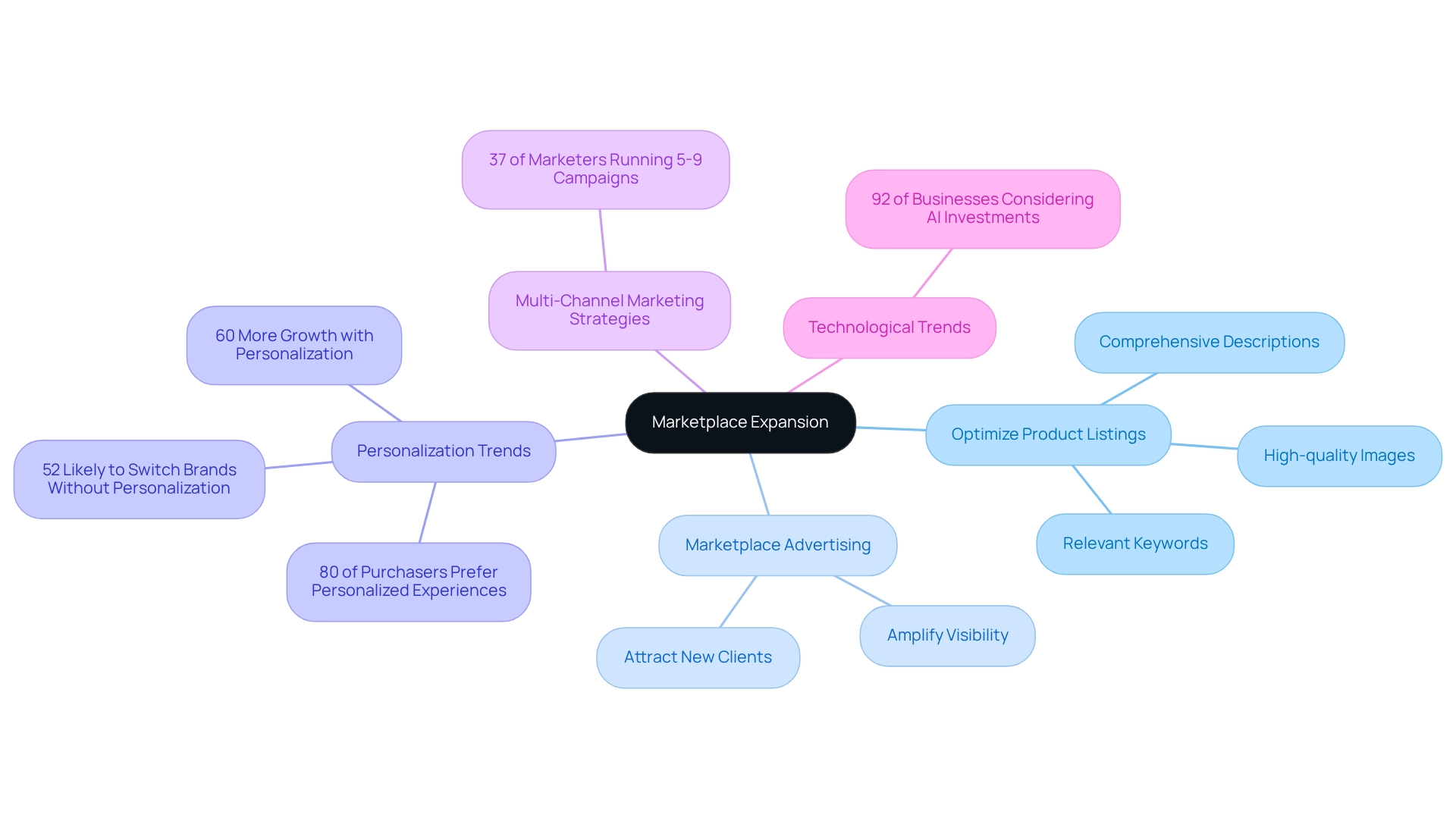
Data Management: Optimize Insights for Strategic Decision-Making
In the fast-paced world of B2B eCommerce trends, the struggle with effective data management can hinder many companies' success. When businesses fail to collect, analyze, and utilize data, they miss out on valuable insights into customer behavior, market trends, and B2B eCommerce trends, as well as operational performance. This challenge can feel overwhelming, but there is hope.
RNO1's performance marketing knowledge, beautifully illustrated in the case study with Cirkul, shows how innovative data management approaches can lead to remarkable growth. For example, by implementing a robust data management system, Cirkul achieved a 30% increase in conversion rates within just six months. This success story serves as an encouragement for other businesses.
By focusing on key metrics, utilizing analytics tools, and making data-driven decisions, you too can enhance your overall performance. Remember, you are not alone in this journey; RNO1 is here to support you every step of the way.
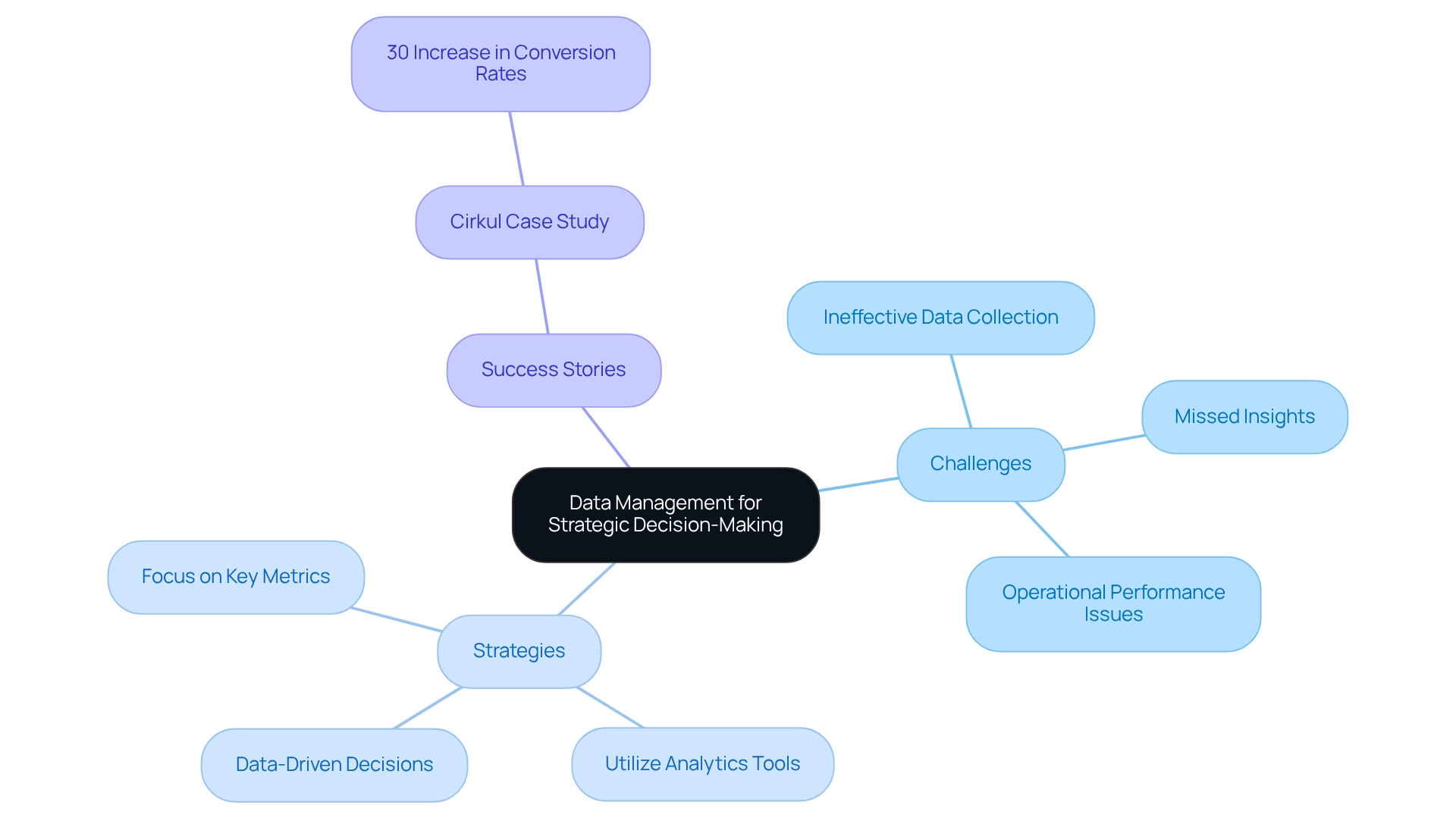
Product Discovery: Enhance Accessibility and Information for Buyers
Enhancing product discovery is a crucial challenge for many B2B ecommerce companies, especially when considering the latest B2B ecommerce trends, and it can feel overwhelming at times. When clients struggle to find the products they need, it not only affects their experience but can also impact the overall success of the business. Imagine a potential buyer navigating through a cluttered website, frustrated by the lack of clear pathways to the products they seek. This scenario can lead to lost opportunities and diminished trust in your brand.
To alleviate this pain point, companies should prioritize optimizing their websites for search functionality. By implementing advanced filtering options, clear categorization, and comprehensive product descriptions, you can significantly improve the buyer's journey. These enhancements make it easier for clients to discover what they need, fostering a sense of ease and satisfaction.
Remember, creating a seamless product discovery experience is not just about technology; it’s about nurturing relationships with your clients. By focusing on their needs and making your products easily accessible, you demonstrate a commitment to their success. Together, we can transform the way clients interact with your offerings, ensuring they feel valued and understood throughout their journey.
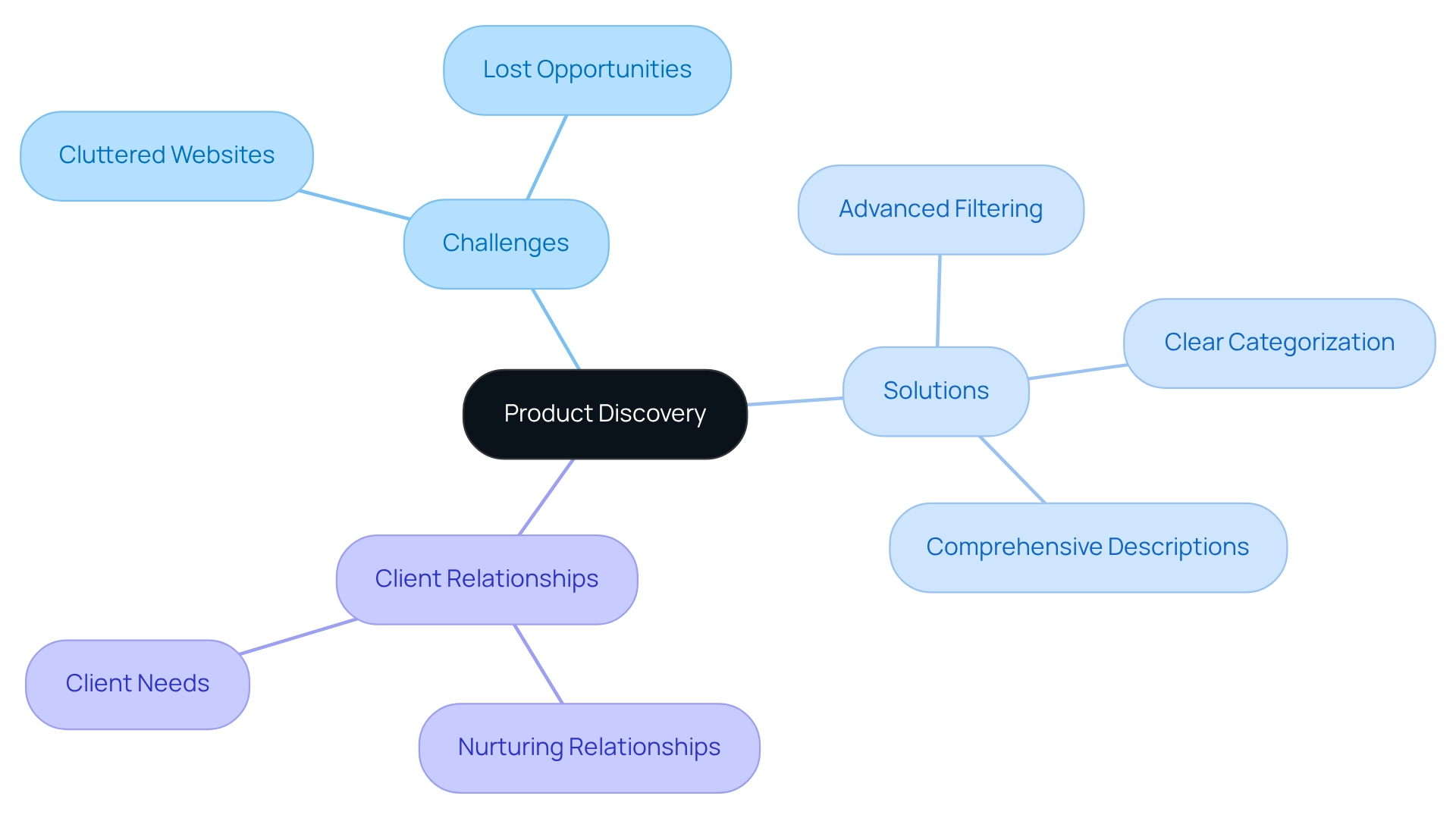
Composability: Build Flexible and Customizable Ecommerce Solutions
In today’s rapidly evolving landscape, many B2B companies face the challenge of creating flexible and customizable ecommerce solutions that align with current B2B ecommerce trends and truly meet their unique needs. This can often feel overwhelming, as the pressure to adapt to market dynamics grows. However, composable commerce offers a nurturing path forward, allowing businesses to integrate best-of-breed technologies and enhance their product offerings.
As we look toward 2025, it’s heartening to see a significant rise in companies embracing these approaches to improve operations and elevate client satisfaction, reflecting the B2B ecommerce trends. Many businesses are discovering that B2B marketplaces can simplify purchasing processes and help identify new suppliers, shedding light on the importance of adaptability in ecommerce solutions.
For instance, those who adopt modular approaches often report improved conversion rates and deeper client engagement, as they can swiftly adjust their offerings in response to changing market demands. This sentiment is echoed by industry leaders like Leigh Ann Tucker, who highlights RNO1's ability to transform branding strategies and enhance digital marketing effectiveness, reinforcing how vital effective branding is for enriching client experiences.
RNO1’s results-oriented approach underscores the power of collaboration in achieving meaningful success. By fostering clear communication and diligent project management, RNO1 helps organizations navigate the complexities of market changes without losing sight of their strategic goals. A compelling example is the strategic rebranding of Founder's Haven, which illustrates how RNO1 equips modern founders to tackle the challenges of digital commerce with confidence.
Moreover, as Donald Porter wisely notes, while clients do not expect perfection, they do hope for prompt resolutions to any issues that arise. This understanding highlights the necessity of a reliable support system within adaptable ecommerce solutions, ensuring that quality assurance and client satisfaction remain at the forefront—key elements of the flexibility and responsiveness that composable commerce can provide, particularly in the context of B2B ecommerce trends.
As companies continue to explore customizable ecommerce solutions, the benefits of flexibility become increasingly clear. Organizations can enhance operational efficiency, reduce costs, and cultivate enduring client relationships. Insights from ecommerce technology leaders further reinforce this trend, emphasizing that the future of B2B ecommerce trends lies in effectively leveraging modern technologies to craft tailored experiences.
In conclusion, composable commerce is more than just a passing trend; it is a strategic necessity for B2B companies eager to flourish in a competitive environment. By embracing this compassionate approach, businesses can position themselves for sustainable growth and success in the digital marketplace.
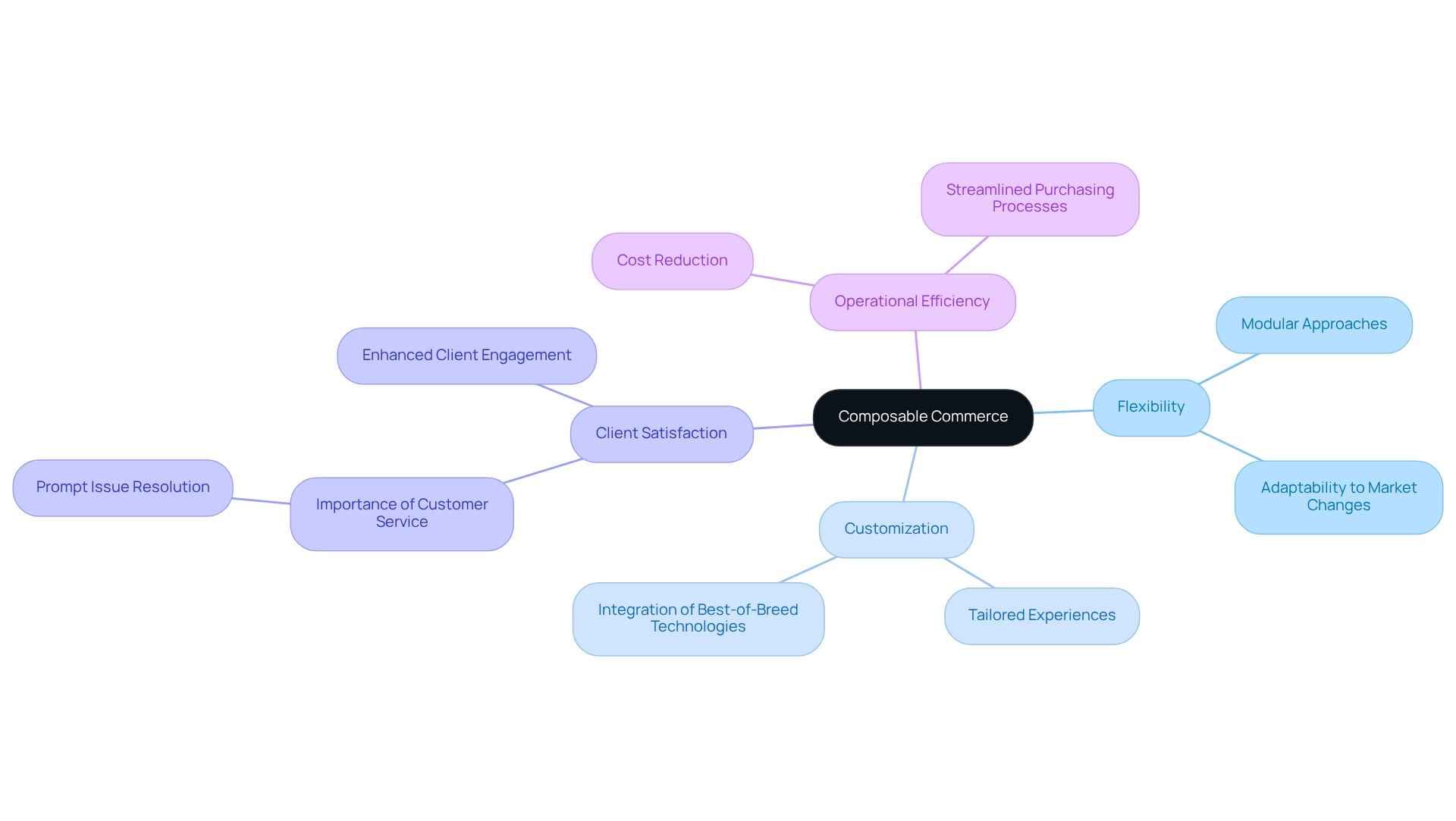
Faster Fulfillment: Streamline Processes to Meet Customer Expectations
In the competitive landscape shaped by B2B ecommerce trends, many businesses face the pressing challenge of slow fulfillment. This issue can create significant pain points, especially as client expectations for swift delivery continue to rise. At RNO1, we understand the importance of measurable results in fulfillment strategies. By prioritizing optimized order processing and logistics, we empower companies to meet these increasing demands. Implementing automated systems can dramatically reduce processing times, while optimizing warehouse operations ensures efficient inventory management. Real-time tracking not only enhances transparency but also builds trust with clients, leading to greater satisfaction.
Consider this: statistics reveal that 92% of consumers are likely to make repeat purchases if they have a positive return experience. This underscores the critical nature of efficient fulfillment approaches. As Alice Davies points out, the average return rate for ecommerce orders in the US ranges from 16.5% to 20%, with some categories experiencing even higher rates. This reality reinforces the need for businesses to continuously refine their fulfillment processes.
Moreover, Taiichi Ohno’s focus on worker-driven standards highlights the necessity of optimizing fulfillment processes. By empowering teams to contribute to efficiency improvements, companies can foster a culture of continuous enhancement. Leveraging performance information is essential for adapting to the evolving needs of the market.
Effective order processing automation has been demonstrated in case studies, such as RNO1's partnership with Cirkul. Through a customized digital platform, we significantly increased client engagement and brand exposure. Our results-oriented approach ensures that these innovative fulfillment strategies not only enhance operational efficiency but also cultivate long-term client loyalty, ultimately driving sales growth in an increasingly digital marketplace. The impact of logistics on B2B customer satisfaction cannot be overstated; in the context of B2B ecommerce trends, efficient fulfillment processes are vital in meeting customer expectations and securing repeat transactions. Together, we can navigate these challenges and create a fulfilling experience for all.
Continuous Learning: Stay Informed with Industry Trends and Reports
In the rapidly evolving landscape of B2B ecommerce trends, the challenge of maintaining a competitive edge can feel overwhelming. Companies must prioritize continuous learning, actively staying informed about industry trends, emerging technologies, and best practices. Engaging in professional development through workshops, attending industry conferences, and subscribing to key publications can significantly enhance a company's responsiveness to market changes.
Organizations that cultivate a culture of continuous learning are better positioned for long-term success. A case study on fostering such a culture highlights that organizations valuing education at all levels and offering abundant resources can optimize the advantages of ongoing training. This nurturing approach not only fosters adaptability but also enhances employee retention, as investing in career development is linked to increased loyalty among staff. Companies can implement this by offering:
- Mentorship programs
- Funding for courses
- Creating internal knowledge-sharing platforms
As we look toward 2025, the trends in B2B ecommerce indicate a shift towards automation and artificial intelligence. Projections suggest that up to 375 million workers worldwide may need to transition to new occupational categories due to these advancements. Staying informed about B2B ecommerce trends is crucial for businesses to effectively navigate the complexities of the digital marketplace. For example, companies like Shopify and Salesforce have successfully adapted to industry changes by continuously updating their platforms and training their teams on the latest technologies.
Industry leaders emphasize the importance of taking personal responsibility for professional growth. As Bernard Kelvin Clive wisely states, "Your professional growth is your responsibility. It's not your employer's job to make you marketable; it's your responsibility." This mindset encourages individuals and organizations alike to proactively enhance their skills and knowledge, ensuring they remain relevant in a competitive environment. Additionally, Jared Schwitzke highlights how RNO1's design-first mindset and impactful results stem from a commitment to continuous learning, illustrating how a design-oriented approach can foster adaptability in B2B ecommerce.
By embracing ongoing education and remaining aware of industry advancements, B2B firms can not only adjust to changes but also foster innovation and expansion in their digital sales approaches, in line with B2B ecommerce trends. Utilizing RNO1's creative performance marketing techniques and transformative branding solutions can be a powerful way to achieve this. Furthermore, Cirkul's role in hyper-scaling eCommerce exemplifies how companies can effectively implement these strategies to achieve significant growth and success in the digital marketplace.
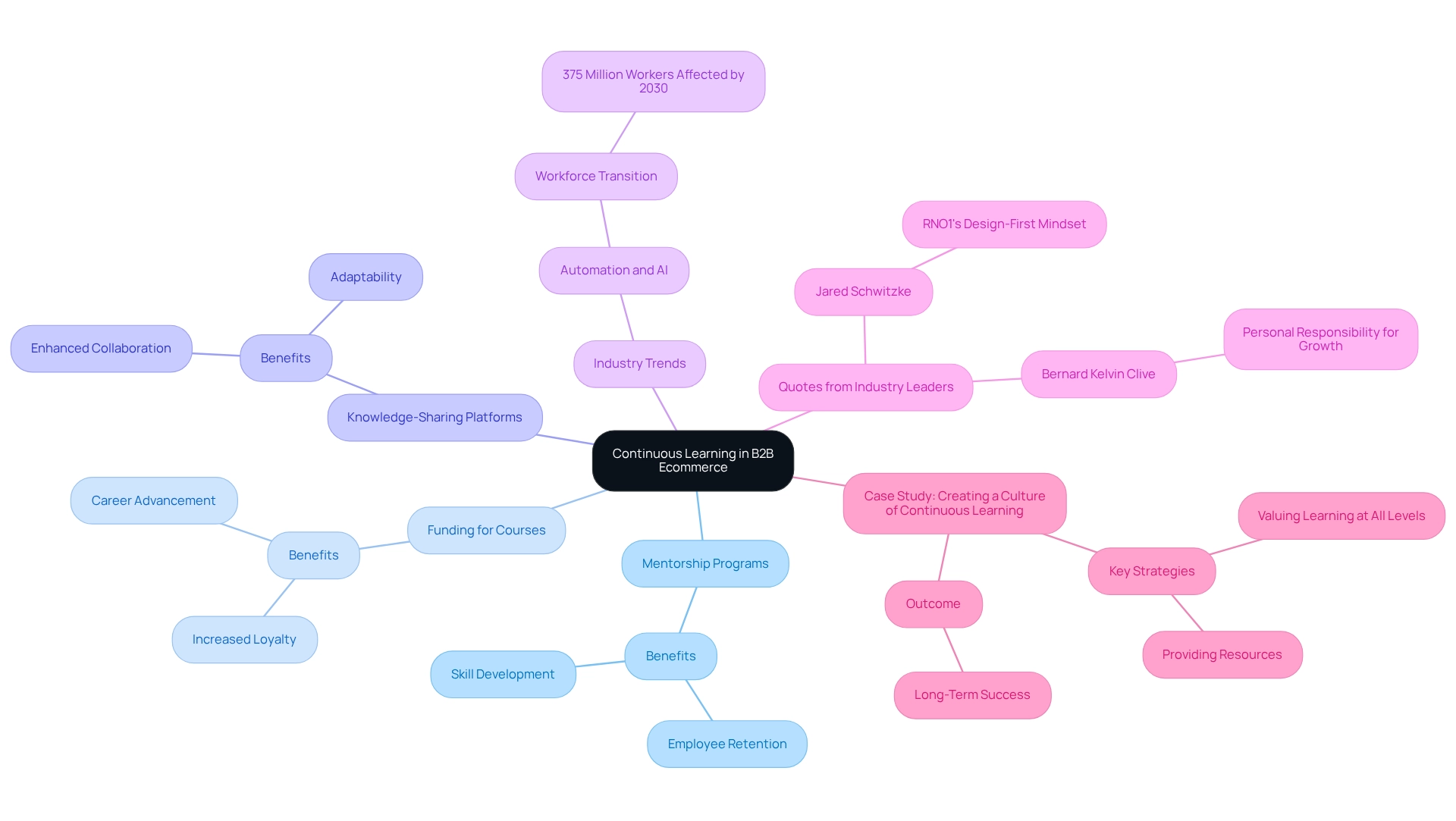
Conclusion
The landscape of B2B eCommerce is undergoing a rapid transformation, and it's crucial for businesses to adapt to stay competitive. Many companies find themselves grappling with the need for innovative branding, personalization, AI integration, and effective data management. These are not just strategies; they are essential lifelines for success in today's marketplace. By embracing these elements, companies can significantly enhance their online presence, foster deep customer loyalty, and drive measurable growth.
Personalization emerges as a vital force in driving customer satisfaction and retention. As B2B buyers increasingly seek tailored experiences, leveraging data analytics to understand customer preferences becomes not just beneficial but essential. In this journey, AI technologies are revolutionizing customer engagement and operational efficiency, allowing businesses to anticipate client needs and streamline their processes with compassion and care.
Furthermore, the integration of social media and the expansion into online marketplaces open up significant opportunities for reaching new customers and enhancing brand visibility. By adopting effective data management practices, businesses can support strategic decision-making, optimizing their offerings based on real-time insights that resonate with the needs of their clients.
As the market continues to evolve, embracing continuous learning and adaptability will be vital for B2B companies eager to thrive. By prioritizing these transformative strategies, businesses can not only meet the demands of today's digital landscape but also position themselves for sustainable growth in the future. Together, we can navigate these changes, ensuring that every step taken is one towards a more successful and supportive business environment.
Frequently Asked Questions
What challenges do B2B companies face in standing out and connecting with clients?
B2B companies often struggle to differentiate themselves and cultivate trust with clients, which can hinder their ability to drive sales.
How does RNO1 help businesses improve their branding?
RNO1 empowers businesses by crafting radical digital experiences and innovative branding solutions that enhance their online presence and foster trust with clients.
What is the significance of branding in B2B sales as we approach 2025?
The role of branding is becoming increasingly critical, with 60% of companies noting that consistent branding contributes to a 10% increase in revenue growth for 20% of their clients.
How does user experience (UX) design contribute to B2B branding?
RNO1 combines cutting-edge UX design with performance marketing to ensure that brands resonate with their target audiences, emphasizing authenticity and genuine user experiences.
What role does video marketing play in B2B branding?
Video marketing is essential for engaging diverse user demographics and is recognized as a crucial element of effective content strategies in B2B.
Can you provide an example of RNO1's successful branding efforts?
RNO1 has partnered with brands like the EOS Network Foundation and successfully rebranded Founder’s Haven to deliver transformative digital branding and UX design solutions.
What is the importance of personalization in B2B client experiences?
Personalization is vital as it addresses unique client needs, enhances satisfaction, and fosters repeat business, with nearly 60% of firms reporting improved retention and conversion rates through effective personalization.
How can data analytics improve B2B marketing strategies?
Data analytics allows companies to monitor client interactions and preferences, enabling real-time adjustments to enhance the purchasing experience and refine marketing strategies.
What future trends are expected in B2B eCommerce regarding AI?
AI is anticipated to become a cornerstone of B2B eCommerce, enhancing client engagement through tools like chatbots and predictive analytics that tailor offerings to client needs.
How does RNO1 integrate AI into its branding strategies?
RNO1 employs AI to create radical digital experiences that resonate with modern brands, focusing on personalized and efficient client interactions to improve overall engagement.




